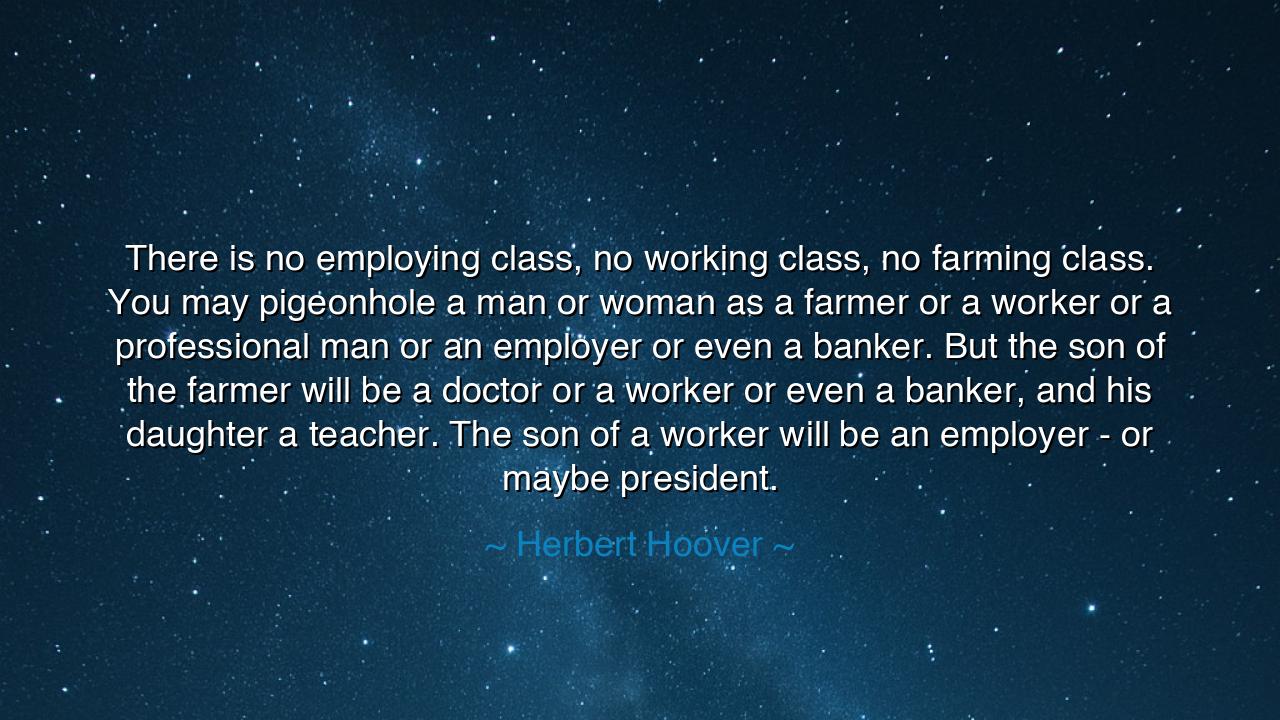
There is no employing class, no working class, no farming class.
There is no employing class, no working class, no farming class. You may pigeonhole a man or woman as a farmer or a worker or a professional man or an employer or even a banker. But the son of the farmer will be a doctor or a worker or even a banker, and his daughter a teacher. The son of a worker will be an employer - or maybe president.






Hearken, children of time, to the words of Herbert Hoover, who spoke with the fire of a prophet in a land of change: “There is no employing class, no working class, no farming class.” By these words, he tore away the veils of division, proclaiming that man and woman are not bound forever by the soil of their birth nor the labor of their fathers. For destiny is not chained to titles nor carved into stone by ancestry. A farmer’s son may ascend to be a doctor; a worker’s daughter may rise as a teacher; and even from the lowliest dwelling may come a president. Thus he taught that in the eternal river of human striving, none are bound, and all may rise.
Consider the wisdom within: the world seeks always to pigeonhole, to fasten labels as shackles, declaring, “You are this, and only this.” Yet the breath of life rebels against such bonds. The seed of man is not confined by the furrow of his father’s plow; the soul of woman is not limited by the station of her mother. Like fire, the spirit leaps beyond its vessel, finding new shapes, new powers, new heights. Hoover’s words remind us that classes are but illusions of the age, while the human spirit is eternal, restless, and boundless.
Behold, in history, the life of Abraham Lincoln, born in the rough cabin of a frontier farmer. He was no child of privilege, no heir of wealth. Yet the farmer’s son took to books by firelight, lifting his mind with each word, until from the soil of Kentucky he rose to the presidency of the republic. If ever there was a testimony to Hoover’s vision, it was this: that the plowboy may guide a nation, and the son of toil may speak words that echo through the ages.
Nor is this the tale of one alone. Recall also Andrew Carnegie, who as a poor immigrant boy worked in the dark mills of Pittsburgh, tending to machines for pennies. Yet he did not remain there. Through learning, vision, and unyielding resolve, he climbed beyond the mill, becoming one of the mightiest builders of libraries and institutions. The worker’s son became an employer, and the employer became a philanthropist, teaching us that the arc of destiny bends toward those who labor not only with hands, but with hope.
Thus we learn that classes are not chains but stages, not prisons but stepping stones. The son of a worker may hold the pen of a lawyer; the daughter of a farmer may heal with the hand of a surgeon. If the world says, “Remain where you are,” let the soul answer, “I will go further.” For the truth is this: the greatness of humanity lies not in its divisions, but in its power to transcend them.
Yet, take heed: such rising does not come by wish alone. The child who would climb must arm himself with discipline, with knowledge, and with courage. The daughter who would teach or heal must fill her vessel with wisdom and let not discouragement quench her fire. And all must remember that dignity lies not in high station alone, but in the faithful pursuit of one’s calling, whether it be plowing the earth, governing a people, or writing the word that will endure.
Therefore, O listeners, embrace this teaching: do not let the world bind you with labels, nor let ancestry dictate your horizon. Seek out learning as Lincoln sought his books; seize opportunity as Carnegie seized the chance to rise. And should you find yourself in fields humble or halls grand, remember that tomorrow’s greatness may yet be born from today’s toil.
So let this be the law of your heart: transcend the class, transcend the name, transcend the limit. Be not only what the world calls you, but what your spirit dares to become. For within you burns the same flame that once rose from cabins, mills, and farms, to guide nations and shape the destiny of humankind.






AAdministratorAdministrator
Welcome, honored guests. Please leave a comment, we will respond soon